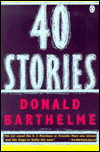 This week's selections are by Donald Barthelme, a literary giant in the world of short story authors. He's known for his exceptionally compact stories, wordplay, and occasional epiphanic moments caught in absurd incidents. Porcupines at the University can be found in his collection 40 Stories and The School can be found anthologized in many short story collections, readings, and in 60 Stories. Porcupines at the University is about a university president's fears about the approach of porcupines that he doesn't want at his university and about a porcupine wrangler, who's not actually bringing them there. Is it an allegory? Or is it just funny images put to words? The School is a fun little story about a classroom dealing with the reality of death, whom my favorite short story author, George Saunders, gives an excellent analysis of its mechanics and perfection.
This week's selections are by Donald Barthelme, a literary giant in the world of short story authors. He's known for his exceptionally compact stories, wordplay, and occasional epiphanic moments caught in absurd incidents. Porcupines at the University can be found in his collection 40 Stories and The School can be found anthologized in many short story collections, readings, and in 60 Stories. Porcupines at the University is about a university president's fears about the approach of porcupines that he doesn't want at his university and about a porcupine wrangler, who's not actually bringing them there. Is it an allegory? Or is it just funny images put to words? The School is a fun little story about a classroom dealing with the reality of death, whom my favorite short story author, George Saunders, gives an excellent analysis of its mechanics and perfection.DISCUSSION QUESTIONS
The School
1. Comments on style? (POV, language, tone, etc.)
2. How do we deal with death? When a student dies in one of our buildings, how do we respond to support those who knew him/her? What's the typical university response? How do we respond to support the residence hall population? How do we respond to individuals?
3. Are we equipped to confront death on campus?
4. How do we answer questions from our mentees to which we don't have an answer? Can we say "I don't know," and maintain credibility/authority/value?
5. What do you think of the story's resolution? Do you, like the children, cheer wildly?
Porcupines at the University
1. Comments on style? (POV, language, tone, etc.)
2. Do you read this as a funny, absurd tale with strange characters? Or as an allegorical fable?
3. There is a clash of cultures between the world of the porcupine wrangler and the world of the dean. Their different assumptions and expectations almost lead to a tragedy. What clash of cultures do we experience in our work at a university?
4. Are there fears about the possible over-enrollment of any particular population and the campus' ability to manage that population?
5. The dean and the wrangler embody too different ideas of accomplished men. How do their views/treatment of women (dean's wife / fancy women) reinforce or undermine their masculinity? What roles of manhood do our male students seek and do those roles affect their treatment of our female students?
6. In the final paragraph, Barthelme writes,
"The citizens in their cars looked at the porcupines, thinking: What is wonderful? Are these porcupines wonderful? Are they significant? Are they what I need?"Assuming the porcupines are an allegory for "the other," how do the citizens' thoughts compare with how the dominant culture views "the other."
.jpg)

+by+Daniel+Hertzberg+for+The+Wall+Street+Journal+66.JPG)